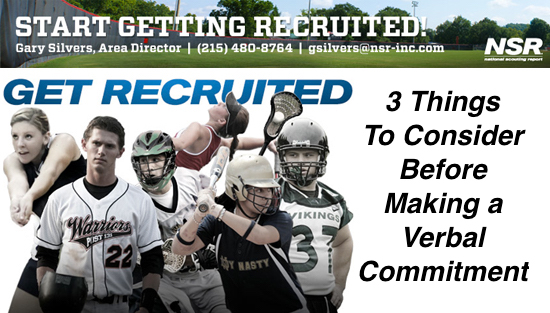 The following article is sponsored by National Scouting Report. Visit NSR’s web site at http://www.nsr-inc.com/
The following article is sponsored by National Scouting Report. Visit NSR’s web site at http://www.nsr-inc.com/
3 THINGS TO CONSIDER BEFORE MAKING A VERBAL COMMITMENT
Verbally committing to a college or university is up for debate in its relevancy and importance. For many athletes and coaches, verbally committing means something and holds value.
However, according to the NCAA: “A verbal commitment happens when a college-bound student-athlete verbally agrees to play sports for a college before he or she signs or is eligible to sign a National Letter of Intent. The commitment is not binding on the student-athlete or the school and can be made at any time.”
With a verbal commitment, you can only hope that college coaches and student-athletes will stick to their words because there isn’t anything binding them to the commitment.
Unlike the NLI, verbally committing doesn’t mean you will receive that offer or an offer at all. A college coach can retract a verbal commitment or change the offer at any point, and athletes can back out at any time. Verbally committing can be a sticky situation for both college coaches and student-athletes.
Here are three things to consider before you verbally commit:
Are you finished visiting? Once you’ve made the decision to commit verbally to a program, it’s frowned upon to go on official or unofficial visits to other colleges. Even though you technically can, if you choose to do that, the offer you received from the other school may not be there. If you’re even slightly considering going on visits to other schools, it’s probably not a good time to verbally commit.
Have you done all your research? Sometimes a significant scholarship offer can make athletes forget about the bigger picture. Yes, you want scholarship money, but it’s important to make sure the school meets your requirements (i.e. degree program, class size, location, facilities, etc.)
Have you weighed all of your options? Nowadays, verbally committing happens before a student-athlete has a chance to weigh all of his or her options. Take this seriously into consideration because if you do have a few years left in high school, you may have more opportunities out there. Don’t rush the recruiting process because you never know what else could be out there. Maybe you’ll receive a better offer if you wait a year and improve your skills.
At first glance, it sounds like an excellent idea to commit to a college or university before you sign a National Letter of Intent. Verbally committing makes the rest of high school and the recruiting process easy because you’re finished and know where you’re going to college. However, it also means you’re going to cut all communication with other college coaches and only talk to the coach to whom you’ve verbally committed unless, of course, there’s a coaching change.
For most athletes, the recruiting process happens only once. Don’t cut it off early if you aren’t 100 percent sure of your choice. Verbally committing can be a great thing, but if not done or treated properly it could end up not working out. If you do verbally commit somewhere, stay true to your word. College athletics is a small community, and you don’t want to start your collegiate career with a bad reputation associated with your name.
National Scouting Report, the world’s oldest and largest college recruiting organization, has received dozens of requests from college football coaches seeking 2018-20 prospects. More than 95 percent of NSR’s qualified prospects receive scholarship offers. For more information, contact NSR Area Director Gary Silvers, former Executive Sports Editor of the Bucks County Courier Times, at (215) 480-8764 or gsilvers@nsr-inc.com.
- Log in to post comments


